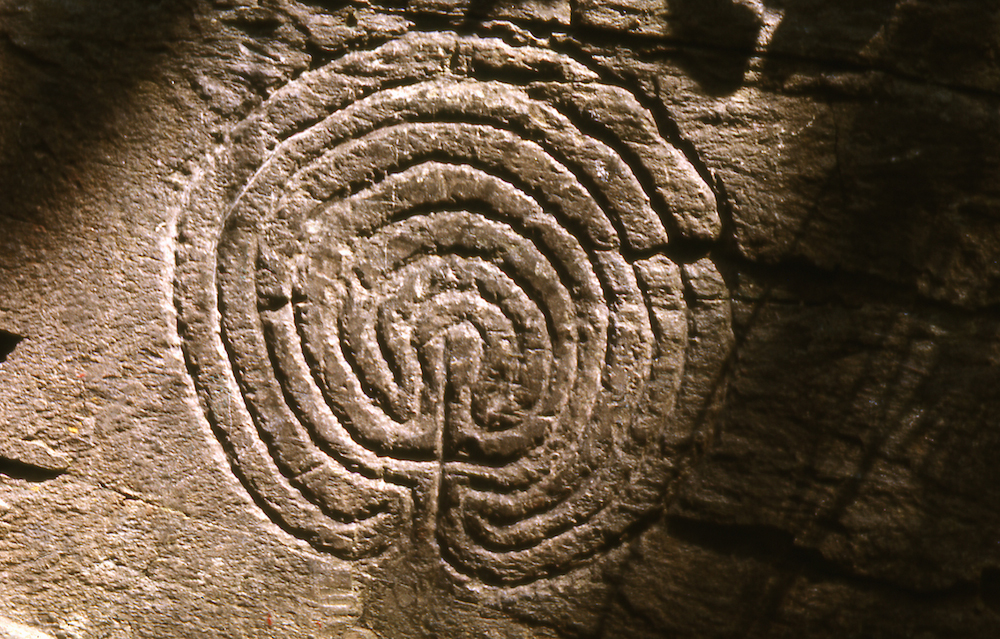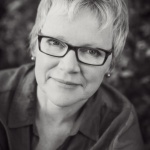I step into the labyrinth wondering if I’m up to it. I know it’s meant to be a spiritual task, like meditation, but I come from a family of athletes and academics. Words like meditation and spiritual make me nervous. It also makes me nervous to be facing my own mind.
The labyrinth is at a retreat centre on Vancouver Island. I’m here with a group of fellow writers. We’ve been maintaining silence through our days. You’d think spending entire days without talking to people I would already be used to dealing with myself but it’s remarkable how much distraction is available even in silence. I’ve been going for walks, reading, writing. I spent part of this morning studying a spider’s web I’d accidentally damaged when I moved a chair. It seemed for a time terribly important to try to understand it. I studied the lattice work still intact around the hole I’d made and admired the tidy curving lines and the way light glinted off them. I’d also been reading and taking notes from Northrop Frye’s The Great Code: The Bible and Literature, a book that seemed appropriate, a kind of marrying of purpose and place. The retreat centre happens to be run by nuns and some of the women I’m with are deeply spiritual. For the weeks leading up to my departure, I’d been joking to anyone I thought could bear it, “Finally, I’m getting me to a nunnery.” My husband, at least, laughed.
I walk through a small wooden archway to get to the labyrinth. On one of the posts the word “peace” is stamped in black letters. The labyrinth is intricate, carefully made, the pathways formed of irregularly shaped paving stones, the surfaces indented in places with what look to be the splayed imprints of a child’s fingers. Because the surface is uneven, I have to pay attention to the way my feet land so I don’t roll onto an ankle. I find this distracting. I want to stride along in my usual way, thoughtlessly, unconcerned by ankles or balance and briefly wonder if it’s common for labyrinth designers to make the earth unsettling.
There are no wrong turns in a labyrinth. It’s just one path. When you enter you are meant to give yourself over to the path and trust that it will take you where you want to go. This sounds reassuring in a way; though I would prefer a maze. I like to go for long walks, purposefully turning away from familiar routes so I can feel slightly disoriented and have to find my way home again. This gives me some sense of accomplishment. The idea of taking a step of faith and trust worries me. Years ago in an unconventional experiment with therapy I worked with some people who suggested I imagine myself before birth. When I balked at the idea, they said, “Why not just try letting go of logic for a moment?” and—this was said kindly—“because how’s that been working for you so far?”
So I let them guide me into an imagined space where I was apparently drifting about, a wisp of free-floating consciousness with a whole lot of other free floaters. And I let them tell me that I had chosen my parents and that I had done so for a reason. The fact that I also imagined this as a cloud of the fat cherubs you see on greeting cards with lyres and wings all searching for the exit sign was immaterial. My job was to bring the worlds of my parents together. I was to put away my lyre and my cheap sense of humour and get to work. My apologies. I’m extrapolating wildly. I can’t help it when fantasy starts up. I don’t do well with this visualizing business. It’s hot, too hot. I am in the sun a long while. I study the opposite side of the labyrinth and wonder if the path will ever take me there, if I deserve it. But I don’t go there—deserve, not deserve. I step. I step.

Credit: Wikimedia Commons
I brought Frye to read because I am entranced by the things he says about language. It’s not easy reading. I have had to read him with pen in hand, finger on the book, copying out the lines that I want to understand. Writing, my hand forming the straight lines and looping bends of the letters, helped me feel the words as well as hear them in my mind. In this way I could take them in, wrap my mind around them.
My feet wrap or not. I feel clumsy, slightly off balance. The path turns and turns again. I am near the centre and then pitched away again, as if I’m the metal ball in one of those maze games we used to get in our Christmas stockings when we were kids, the plastic disk that you have to tilt, carefully, one way and another to make the ball roll to the middle, to settle into the indentation there.
As I write this—months later in a coffee shop—the idea of the world tilting and shifting appeals to me; then I am impatient, decide I look too much for significance when I’m writing, as if a thread is being played out in front of me, and all I have to do is keep up. It’s not like that. It’s more like a web, and the words on it are sticky. Sometimes too sticky, each one attracting others.
I try to draw a labyrinth and do well enough at the start, but then one side dominates and when I force my way over to the other, the lines are too jagged. I lose my sense of a pathway. I look up labyrinths on the Internet. The image reminds me of a drawing of a brain with its crenulated surface. The wrinkles are called cortical folds, and the crevices are sulci, the bumps gyri. Cortex comes from the Latin word for bark. Most of our thinking goes on in this outer layer, just two to four millimetres thick. It looks like Playdoh rolled into tubes and then folded together, a gelatinous pile of organized worms.
Frye says language develops in three phases—the metaphoric (or poetic), the hieratic (or aristocratic) and the descriptive (or vulgar). In the metaphoric, meaning is contained inside the word itself and there is no clear separation between the speaker and the object being spoken of. By saying the word, the speaker embodies the power in it. “God,” says Frye.
“Mum,” I think, remembering myself as a child, then thinking of my own children, the magic of their first words.
In the hieratic phase words lose some of their power to sentences. In “I think, therefore I am” meaning hinges on “therefore.” The speaker (or subject) is separating from the object. Reason rules here, like in the ordered turns of the labyrinth, where I turn because the path turns. I imagine not obeying the small tyranny of the grassy borders between the stones, but can’t. I have accepted an order higher than myself, the order of the stones. In the final phase where language comes down off its high reasoning horse and is available to the common people again, meaning moves outside of the sentence entirely into the thing being described. And here, because Frye has used God in his examples throughout, I conflate meaning and God and think of a tiny figure with his feet pressed up ahead of him as we try to shove him out of the sentence entirely. But no, that’s not what Frye said, it was something about the descriptive moving back to the sense that initially informed the word. Out of the sensation came the word. Possibly. I may have it wrong.
I walk the labyrinth, my thoughts piling up one after another, not profound, not deep. I think about lunch and worry over having enough time to walk the whole thing. I turn, and turn and turn, impatient to finish, bored. I turn. I try concentrating on my steps, the small crunching noises, the swing of my arms. But it is too much to take in all at once and I can’t imagine a metaphor or phrase that could contain it all. I am looking down because the sun is so bright, though I am wearing sunglasses—surely not appropriate attire for journeys toward spiritual enlightenment. But I recognize that’s a shallow thought, so then I concentrate on posture, feeling the muscles of my abdomen, then my upper chest, aware of my heart busy with its pumping and clenching and that unless I correct myself my body curls defensively around it most of the time as if it’s in constant need of protection. I don’t want to be late for lunch. I don’t want to break the prescribed pattern, which now feels like necessity, as if I would be breaking something in myself if I were to ignore it. I am nearing the end, the turns getting closer and closer to the centre. I make one more, one more, one more, and then I’m there. I stand on the plain circle of concrete at the centre feeling absurdly euphoric as if I’ve just climbed a mountain or completed some difficult task. It seems ridiculous to be so happy but I am. I stand straight, my entire body open and light, everything clear and empty and simple.
I was going to end this piece here—on this uplifting moment—my successful shift from confusion to lightness, but decide that’s too neat. The way back feels shorter; the path takes me to the far edge of the circle and tantalizingly next to the gate, then turns sharply in again. The feeling is of passing right next to thoughts or places I have already trodden. But I have left Mr. Frye to his greater mind, and I have left religion and spirituality, and the sense that I was anywhere near some kind of peace. I think of the challenge of the textured stones, how they continually set me off balance. And because long ago I was an athlete, I decided to take them on in a way I can understand. I think of the walk as some kind of contest with myself, as if labyrinth walking is an Olympic event and I am trying out for the team. I don’t care that this is a ridiculous idea. I am having too much fun, remembering the old ways I used to have of communing with my muscles, and the hours of training and consideration I used to give them.
When the path ends, I don’t feel the euphoria I felt at the centre. I step through the gate and past the peace sign, and my feet land back on the ordinary earth as my mind turns toward the ordinary decisions ahead.
 Jane Silcott's debut collection of essays, Everything Rustles, was shortlisted for the 2014 Hubert Evans Nonfiction award in the BC Book Prizes. She has also won a CBC Literary Award, a Room Magazine Prize, a Readers Choice Award from the Creative Nonfiction Collective and been a finalist in both the National and the Western Magazine Awards. Jane lives in Vancouver and teaches for the UBC Writing Centre and SFU's Southbank Writing Program.
Jane Silcott's debut collection of essays, Everything Rustles, was shortlisted for the 2014 Hubert Evans Nonfiction award in the BC Book Prizes. She has also won a CBC Literary Award, a Room Magazine Prize, a Readers Choice Award from the Creative Nonfiction Collective and been a finalist in both the National and the Western Magazine Awards. Jane lives in Vancouver and teaches for the UBC Writing Centre and SFU's Southbank Writing Program.